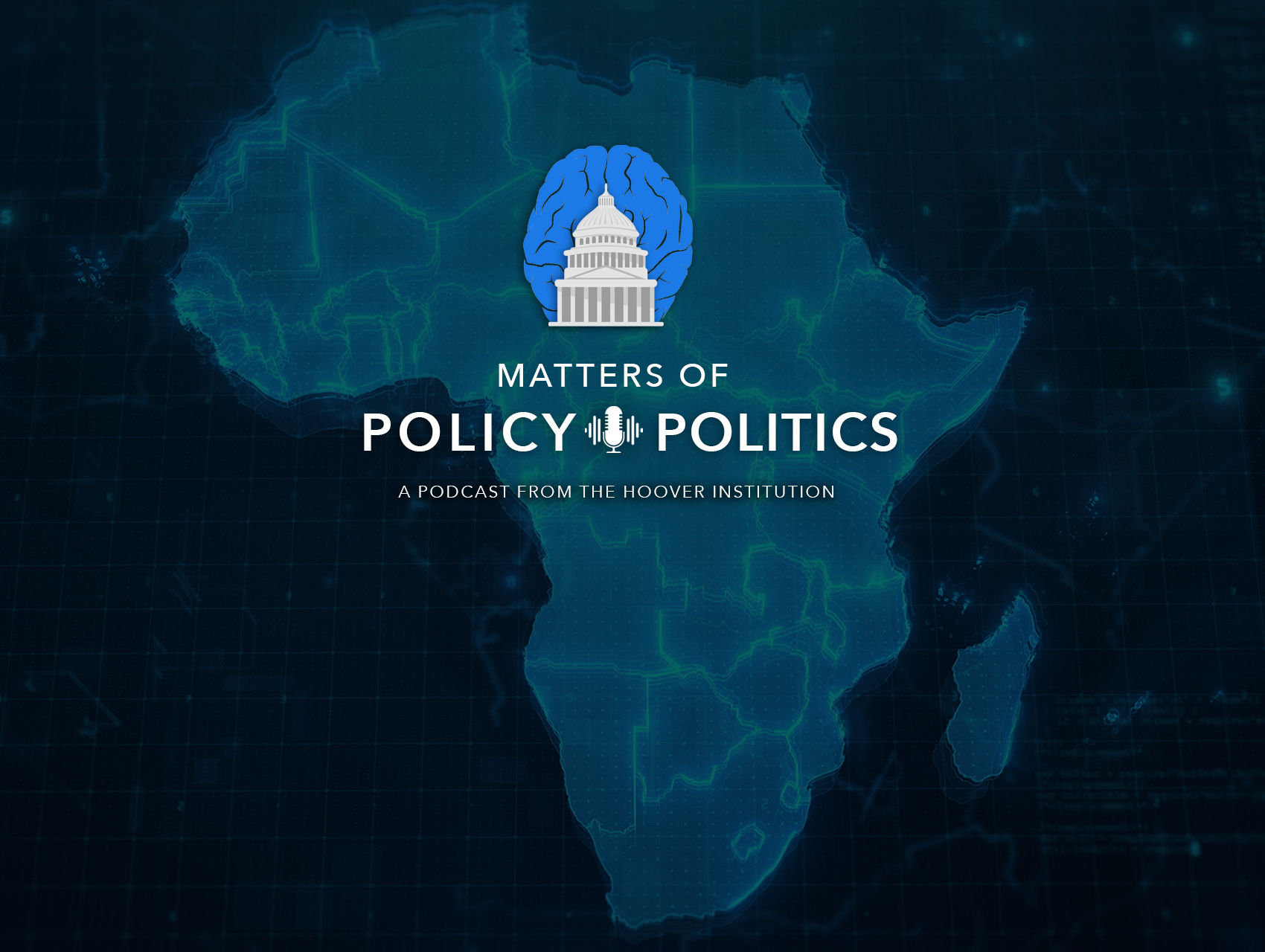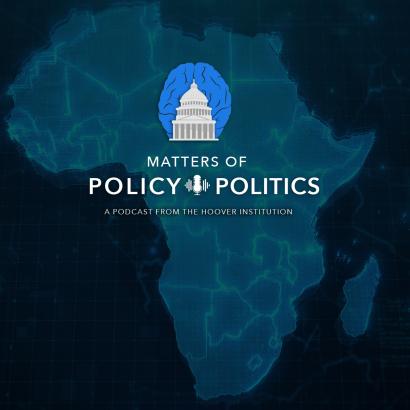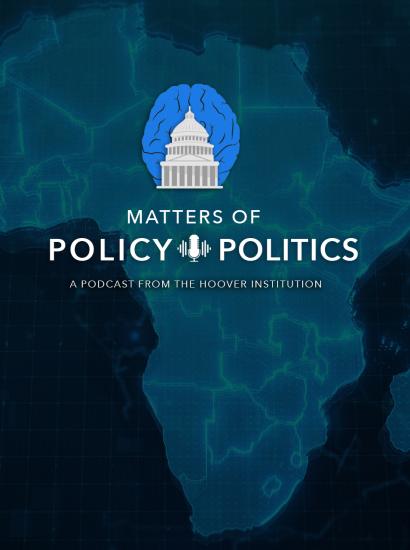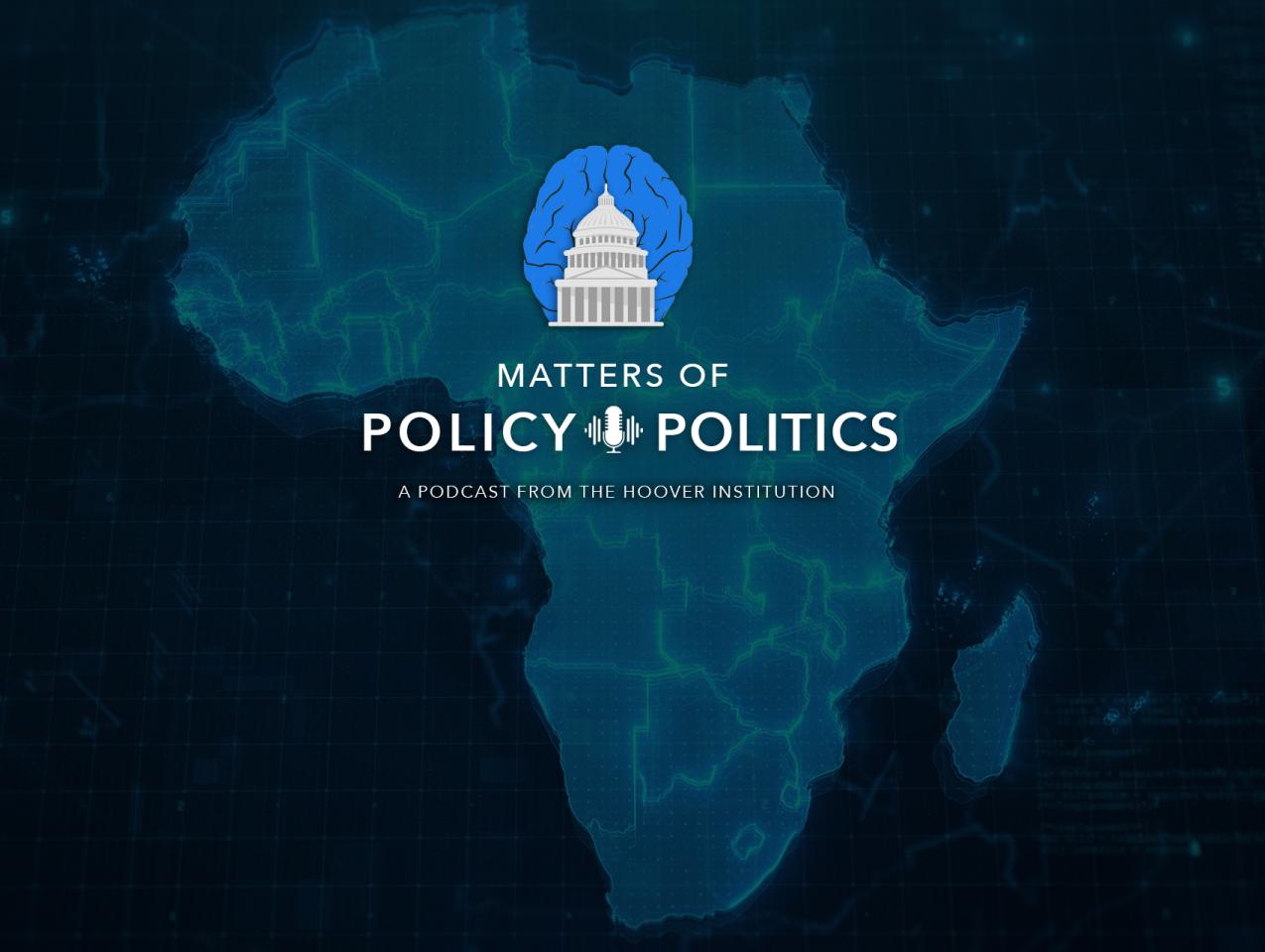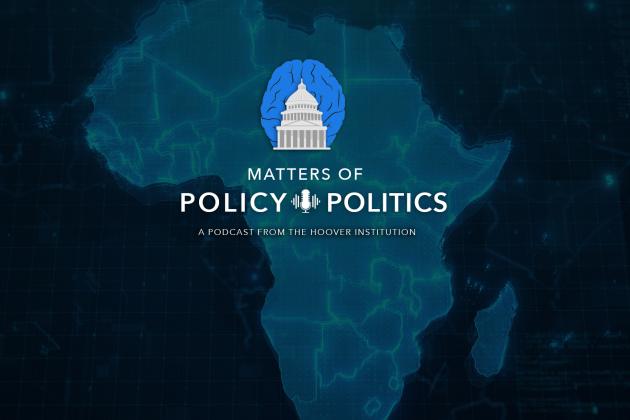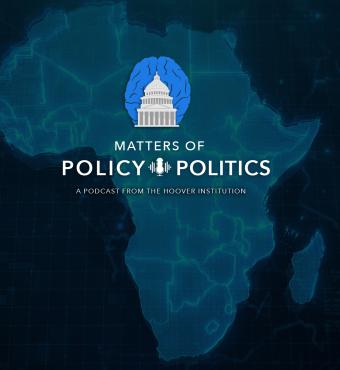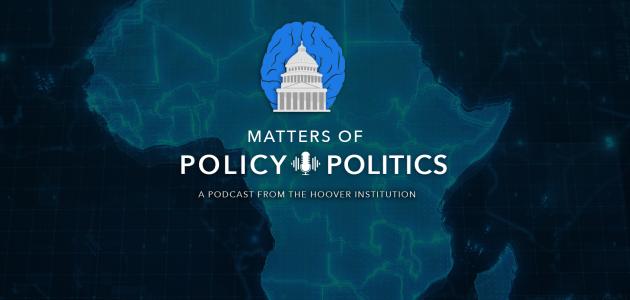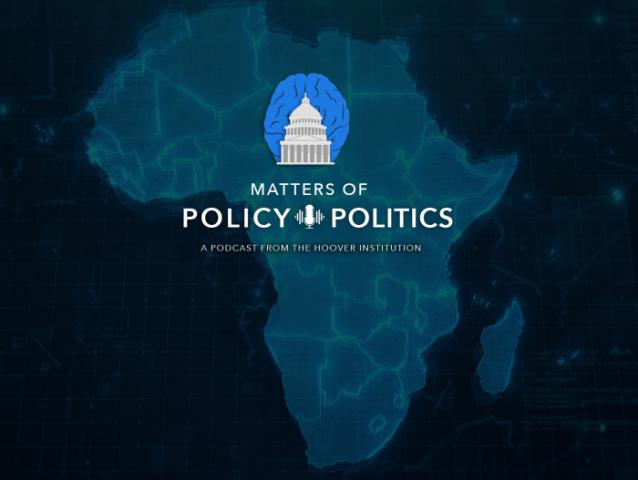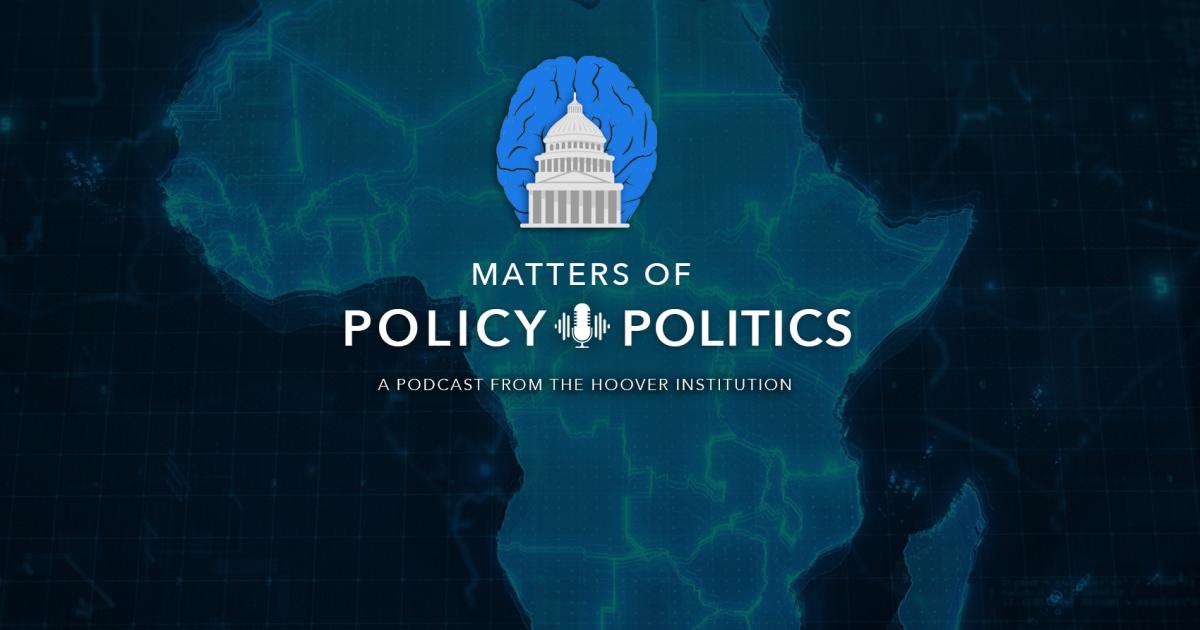At the dawn of the 20th Century, control of the African continent centered around European colonial desires – national pride, natural resources, and manpower. Hoover senior fellow emeritus Thomas Henriksen, author of America’s Wars: Interventions, Regime Change, and Insurgencies After the Cold War, describes what differs in this century other than the former colonies being independent nations—Russian and Chinese influence (think war financing and debt traps), terrorist-related “forever wars,” and a question of direct American involvement (such as special forces operations). Henriksen also offers analysis on last weekend’s evacuation of US embassy staff in Khartoum.
>> Bill Whalen: It's Thursday, April 27, 2023, and welcome back to matters of policy and politics, the Hoover Institution podcast devoted to governance and balance of power here in America and around the world. I'm Bill Whalen, I'm the Virgin Hoover institutions Virginia Hubs Carpenter, distinguished policy fellow in journalism. I'm not the only Hoover fellow podcasting these days.
I suggest you go to the Hoover website, which is hoover.org. dot click on the tab at the top of the homepage it says commentary. Head over to where it says multimedia and up will come audio podcasts. There are 17 in all, including this podcast. Just all kinds of wonderful topics.
And if you just travel a lot or just like to listen to podcasts when you're exercising or just out and about, it's all good content, trust me. Joining me today for a conversation about Africa, some would say as an overlooked continent given the focus on the war in Europe and rising tensions in Asia, is my Hoover colleague, Tom Henriksen.
Tom is an emeritus senior fellow here at the Hoover Institution, where he focuses on US foreign policy, international political affairs, and insurgencies. He specializes in the study of American diplomatic and military courses of action toward terrorist havens of the non western world and toward rogue regimes. Tom Henderson joins us today to discuss the column he recently wrote for the Hoover Institution's defining ideas journal.
It's titled power and persuasion in Africa. It's a look at how Russia and China are increasing their wealth and influence throughout the continent. If you're interested in this topic, by all means, go check it out. Tom, thanks for coming on the podcast today.
>> Thomas Henriksen: It's good to be with you.
>> Bill Whalen: So before we get into Africa, a little sad news of note. Here at the Hoover institution, we lost a past director, John Racian, who was the director of the Hoover Institution from 1990 to 2015. Just a wonderful guy, passed away after a long illness. I cannot emphasize how much just what a good fellow John was.
He just walked the halls. If he saw you, he always had a smile on his face. He'd stop you and wanna know what's going on in your life. Always just a good guy to talk to. Cheerful, wonderful outlook on life. Tom, you knew John actually longer than I did.
I came into Hoover at 1999, you precede me at Hoover by a couple of decades. John, I think joined Hoover in 1985. Just give us a few thoughts on what was John Raisin all about.
>> Thomas Henriksen: Well, I think John came in at a very tumultuous time. There had been a great deal of tension between Hoover institution, Stanford University, much of it over whether the Ronald Reagan Memorial Library would be built at Stanford or as it turned out, to Simi Valley down in southern California near Los Angeles.
That period had really impacted the Hoover institution because of its former director. There had been a lot of tension, as I mentioned, and it was a kind of unsteadiness. And I think John had a unique ability to be really calm when the rest of us weren't calm, and he looked calm and he kind of settled things down.
It took a little while for us to solve, or him to solve. The biggest problem we faced was a deficit in spending which he did. It took us three or four years to do that, but he did it. He also studied the place in relations with Stanford, and he brought in several really very good scholars who added to the already good cast of cadre that preceded him.
>> Bill Whalen: Yeah, I'll note. And also the Treytel building which I'd point to the Jonah David Treytel building which if you're on the Stanford campus, is just a beautiful structure, and we at the Hoover institution use it for a lot of our events with overseers and public meetings and so forth.
Very fitting. I thought, that the courtyard is named after him.
>> Thomas Henriksen: Indeed, yeah. That is good news. I think he needs to be recognized more because he was quiet in a sense. I mean, he wasn't always beating his own drum, and I think it's good for us who are still around to do that for him.
>> Bill Whalen: Well put. Well let's shift, let's shift the topics now Tom to Africa. And before we get into your column, let's talk about the news out of Africa this past weekend, and that is the events in Sudan. US special forces, special ops forces going into Sudan to rescue, I should say, workers from the US embassy, I think, Tom, they sent in three helicopters and rescued something like 70 Americans.
There are still, I believe, 16,000 Americans left behind in that country. So this sounds very much like Afghanistan again. Were you surprised when you saw this news?
>> Thomas Henriksen: Not totally because Sudan has been unstable for several years now. Back many, many years ago, it was a haven for terrorists, and it also was one of the so called rogue states, along with North Korea, Iraq, Syria and Iran.
It was never in the forefront because it didn't really go after nuclear weapons in a serious way. But it's had a kind of rocky period in its history. It's not one of those stable countries and so wasn't totally unexpected. And since the war between these various squads or various groups has been going on for a while, so I wasn't totally surprised.
>> Bill Whalen: So what are the US options here with regard to Sudan? Do we just stand by and watch the war, the fighting continue to go on? Do we escalate our attention to this, Tom, because between what's going on in Ukraine and what's going on with China, we're already kind of.
Kind of strapped as is.
>> Thomas Henriksen: Yeah, we certainly are. The United States along with other countries, has managed to secure a kind of humanitarian scale down in the fighting that probably won't last. However, there's not a lot of leverage that we have. I mean, we can't offer too much.
We're trying to broker peace between two really militia type organizations. One represents the government of course, but the other is a derivation of government forces into a militia. So we don't have a lot. I think we can try. Maybe when both sides are exhausted themselves, they'll be more reconciled to some sort of peace agreement, but it doesn't look like it's gonna be soon.
>> Bill Whalen: And let's talk a bit, Tom, about the role that special ops forces play here for the US and Africa and other countries. Our viewers might be interested to know that you work at, of all things, the Joint Special Operations University. Yes, there's such a thing. It's in Tampa I believe, Thomas, and a part of Southern Command.
>> Thomas Henriksen: Yes, it is actually a separate command. Special Operations Force or Special Operations command is a separate command, but it specializes in hostage rescue, at least the seals do, to a great deal. And so then the Delta Force. And as a consequence, they're excellent at this sort of thing.
And these are the same groups, particularly the seals, who eliminated Osama bin Laden back in 2011 when he was number one on our terrorist list.
>> Bill Whalen: Right, they call it I believe, the think do tank.
>> Thomas Henriksen: Yes, that's it. They are really good at this sort of thing.
You can't give them enough praise for how they execute these operations.
>> Bill Whalen: Okay, so you're part of the university, so can you actually tell us what you're doing there, or is this confidential or is it top secret or what? What exactly does one study? We wanted studying joint special operations.
>> Thomas Henriksen: Well, my tiny role as a senior fellow at so called JSOW joint Special operations University was to write things. Everything I ever wrote was done from open sources. I never published anything from secret sources or anything. It was even a little bit shady. I was very careful.
And we also had a pretty strict regimen about, if we did mention certain things, we were to run those articles or those books past the authorities at the joint special operations, universities, so they could clear anything or tell us to remove it. So it was a relationship that we based on open sources.
>> Bill Whalen: Mm-hm, and Explain, Tom, how this ties into the last book that you wrote the title of that is America's wars, interventions, regime change and insurgencies after the Cold War.
>> Thomas Henriksen: Well, I covered all of the wars United States engaged in, as you point out in the title, since the fall of Berlin Wall and that started with Panama.
We got into the United States, as you know, the Persian Gulf war was caught up in Bosnia and in Kosovo and of course, after 9/11, we intervened in Afghanistan and then Iraq. But there were lots of part of the war on terrorism just engaged against places like Iraq or Afghanistan.
There are several others that are ongoing at the present time. One, in fact, in the Philippines and several in Northern part of the African continent, particularly in the Sahel region. These are really minuscule wars, or frontier wars, so to speak. And American forces do not directly engage, frequently they provide support and training, and they also provide intelligence and sometimes mobility, that is to say helicopters.
And on a rare occasion, they will actually enter the fight themselves. And something like the hostage rescue that just took place in Sudan as a direct intervention of American forces. But many times it's seen indigenous people of those countries that are trained by the special forces to engage against ISIS and also Al Qaeda, which are both operating in this Northern region of Africa.
Which includes countries like not only Libya, but Cameroon, Central African Republic, Burkina Faso and Mali, and even down into Mozambique, which is in Southern Africa.
>> Bill Whalen: Right, so the purpose, role then is to advise, to help train, to just help the sisters, but not shed blood, it sounds like.
>> Thomas Henriksen: That's correct, the idea is to let the indigenous people do it. The people that live there, they have a lot at stake, and they are very willing to do this, and it's better that they do it than we do. It's their war, not our war, and we wanna help them win it, because if we don't, terrorism may spread to the United States or to Western Europe as it has in the past.
>> Bill Whalen: Okay, let's talk about the column, Tom, power and persuasion in Africa. You started out by calling this the second scramble for Africa. I assume the first scramble was colonization Britain, Germany, France, Belgium, all planting their flags across the continent. Tom, this would have been for natural resources, and especially in the case of France, manpower come the time of the first World War.
What defines, Tom, the second scramble?
>> Thomas Henriksen: The second scramble, you describe very well the first scramble. The second scramble is different. I think the first scramble was more for national prestige. The countries you mentioned, and also including Portugal.
>> Bill Whalen: Right.
>> Thomas Henriksen: These were countries that wanted to stake out claims in the world.
This is part of getting their place in the sun, as the Germans said when they took over Southwest Africa, the idea that they would colonize. They would, in fact, take out some resources, of course, but they also did a lot for building up infrastructure in the countries. They were the ones who built the railways and telegraphs and bridges and started schools and clinics.
This was part of their so called civilizing mission, and they all felt this but Europe had a kind of obligation. Now it carried along with this sense of obligation to help someone out. It carried seeds of racism because there was a kind of feeling that these European people were very advanced over the African peoples, and therefore they had a tendency to look down on this was an unfortunate part of this conquest of Africa.
But most of the continent was divided up just a few countries. Ethiopia and Liberia managed to escape direct colonization, but most countries were taken over, and that lasted until after World War II and the early decades afterwards, into most of the European countries were expelled from Africa.
>> Bill Whalen: Right, so in terms of talking about the second scramble, Tom, you say there are two countries principally involved here, one Russia, the other China.
And what you discuss here is you call it a natural match, and that you have undemocratic African nations teaming up with dictatorial regimes in Moscow and Beijing is it? It's a simple read, but is as simple as that, really, if these countries just line up that way.
>> Thomas Henriksen: Well, what happens, but these countries, some of them are unstable.
They have rapacious rulers, non-democratic, dictatorial rulers, and they're facing insurgencies or they're facing opposition within their country. And so they turn to either China, which usually provides resources and buildings and transportation, but also pays off people and, of course, the Russians are in the big time. The Russians are interested in resources.
They're also interested in the way of confounding the West whenever they can. And they aid African states sometimes by the use of mercenary forces that are also used in the war in Ukraine. That is to say, this mercenary group is bye called the Wagner Group. That's a name, it's derived from, actually, Wagner that they picked that name.
And then they are being used because mercenaries are not particularly honor bound to observing the rules of war or prisoner exchange. And sometimes they can be pretty ruthless, and they are in Africa, as they are in Ukraine also.
>> Bill Whalen: Okay, so simple question here, Tom. What is in this for Russia?
What is Russia's intent in Africa?
>> Thomas Henriksen: Well, I think Russia wants several things that's a very good question that goes to the heart of what they're up to. The Russians want certain resources, and they wanna sell things to other people. They sell arms, the Chinese, of course, are much ahead of them, as is the United States, but they also want influence around the world, and they want to confront America with another front.
As we know, China is pushing us hard in Taiwan, but the Russians are also pushing us very hard in the Ukraine, as well as Syria. And they are interfering in Syria, as well as these North African states, by providing them training, providing them some arms, and they gain leverage over that.
And they can take up the cultivation of gems or take mining of gems of gold. And they also have access to things like bauxite, which is used for aluminum. So it's pretty much very centered around their own interest and they have less idea of what the Europeans did 100 years ago, civilizing missions are trying to improve the country.
They don't have that at heart. They're much more focused on their own agenda.
>> Bill Whalen: Right, they could, for example, help with the mining of gold. I think the Wagener group is involved in gold mining, if I'm not mistaken. And they could smuggle gold, Tom, and you could use that money to finance your war, right?
>> Thomas Henriksen: Well, that's true. They use it for that, and they also wanna sell whenever they can. Africa does have, many parts of Africa does have oil, but they can also sell petroleum to them, too. So they're definitely, it's calculated to be in their own interest. This, as I say, this is not some humanitarian venture by any stretch of imagination.
>> Bill Whalen: Okay, so when Russia, Tom, wants to help develop port Sudan with infrastructure the way they wanted to help the Syrians with port infrastructure as well. We saw that we thought the Russians want to establish a foothold in the Mediterranean for naval forces. Is that the play for Russia as well?
Do they wanna get involved in the Red Sea?
>> Thomas Henriksen: Well, there's some of that. They want to. In the United States, it does have a base, of course, in the Horn of Africa, as does China. The Chinese are also interested in acquiring a base on the west coast of Africa.
But all of this is calculated to, as I say, tax the United States, which has, as you've indicated at the beginning, a lot of problems on this plate right now with Ukraine, with Taiwan. And this is just one more thing. And it requires us to engage in another place with slender resources and almost a very difficult terrain for us to work in.
>> Bill Whalen: Okay, let's turn to the other player here, China. This might be a little more of a complicated conversation. I look at what China is doing in Africa, and the first thing that stands out, Tom, is the idea of debt drastic. Explain what China is doing with regard to African nations and debt.
>> Thomas Henriksen: Well, what the Chinese under the leadership, Xiang Zhang Ping, is, they have decided to further own trading interests by launching a huge, very expensive program called the Bridges and Roads Initiative, which builds infrastructure, particularly for transportation, to harbor. And harbors, of course, and could be roads, or it could also be dams, airports, and railway, of course.
And this is a way of encouraging debt in these countries because they can't really pay it back. And so China can expand by using that. It's a different model than the Russians, who are more dealing with life and death issues and shooting people and so on. The Chinese way is much more subtle in a way, but it's sometimes more effective because these countries become terribly dependent on China.
And in order to pay off this debt, or at least to assuage it in some way, they will grant favors to the Chinese. That favors could include bases usually, and favored nation trade with China. So the Chinese model is more entrepreneurial, less militaristic, but also very effective.
>> Bill Whalen: I think I saw Tamar Djibouti and Angola.
They both are deeply indebted to China. I think their debt exceeds 40% of their gross natural incomes.
>> Thomas Henriksen: Well, that's it. That's example. I mean, Angola is a very wealthy country with oil and cabinda, just a little enclave north of it. But also it's a country that could really be very developed.
But by incurring these kind of debts, they're huge. And Djibouti, in the case that's on west coast, the country itself has granted the Chinese some basing, so it pays off. And also in Sri Lanka, the same sort of phenomena. Well, Sri Lanka is a long way from Africa.
It's the same sort of situation where their harbor is indebted to building this massive harbor they have wanted has made China a major player in our country. And that's the Chinese are doing this deliberately to create a debt in various developing countries.
>> Bill Whalen: Right, so, Tom, if the Chinese have a naval presence in Djibouti, that is the intersection of the Red Sea and the Gulf of Arabia, I believe.
So, now they have a potential to do two things if they wanted to. I mean, if we really kinda getting deep into the geopolitical weeds here. One is they could mess around again with the Suez canals. Could the Russians, if you control the Red Sea, then you cannot entertain the canal from going south to north.
And also if you're going north to south, you can't get out of the canal if you have forces there. And also, Tom, if they're in Djibouti, then they're not too far from the gulf, which gets an oil traffic. And now you have a chaotic world scene. Of course, then again, the Chinese are reliant upon oil, so maybe not so much, but again, there's a military presence.
>> Thomas Henriksen: Yes, there is. And it's also tied, and you did a good job of summering the issues. And it's also tied in with Iran, who's become a player with Russia, particularly, but also of China. In Iran, as we know, is not a friend of the United States and hasn't been since the fall of a Shah, 1979.
It's been an implacable foe for us. And so all of this is geopolitical. There is aspects of this to take control, or at least to cause United States problems and worries about, we are less oil dependent than Europe, and we seem to help the Europeans in this dependency by trying to help the Europeans in places that are unstable.
So it is a factor in their calculations, China and in Russia. And it doesn't mean that they necessarily see eye to eye on every issue. They are allies, but they do have their own perspective and they have their own agenda items.
>> Bill Whalen: Okay, let's talk now, Tom, about what's in all of this for the United States, for America.
So much of the conversation about our Africa, Tom, in US circles, revolves around humanitarian aspects of what's going on in the continent. We talk about the growing population, and will Africans be able to feed themselves, and will they be able to get good healthcare? Will they get education?
Will there be migrant crises if there is not economic opportunity in Africa as well? One thing that doesn't get a lot of conversation, though, what you talk about in your defining ideas piece, though, Tom, is the issue of terrorism.
>> Thomas Henriksen: Well, there's that. This is another problem. In addition to encroachments by China and Russia, which are calculated to be disruptive in some respects, they also, United States faces this problem of terrorism.
And outfits like Al-Qaeda, which did the bombing of the planes flown into the New York City Twin Towers and also into the Pentagon, they haven't been doing so well in Central Asia as they used to do. And they're not. As they also ISIS, they're not doing as well.
So they've now picked on this vital region between North Africa, the Shahil, the Sahara desert in tropical Africa. And these groups are very, very sophisticated in winning over locals. They are locals themselves, but they're winning them over by providing certain services to them. They create a certain law and order.
They provide jurisdictions or judicial services. They also can prey on the fact that these people, that they're all Muslims. And they're just using this element of common religion against the west whenever they can. So, it can be quite murderous to their own people who don't go along with this, and, of course, for the United States and its western allies.
>> Bill Whalen: Yeah, I believe Tom, didn't Bin Laden, he originally, I think he had legitimate businesses in Sudan. I think Tom had a tannery, he had a couple of large farms. I think he had a road construction company as well.
>> Thomas Henriksen: That's true, yeah, to pay the bills, he had to do this when he couldn't get enough sponsorships from wealthy Saudis.
They have sometimes engaged in their own activities, growing of things or things they could sell to others.
>> Bill Whalen: Okay, so I want you to visualize for our audience a map of Africa, Tom, and I'll let you have as many pincushions as you want here. Put pincushions on the map on countries or parts of Africa where we would be concerned about terrorism, such as Somalia and so forth.
Show me either countries that are potentially harbors for terrorism or either hotspots or cold spots and potentially could build hot spots. We'd have to have at least three colors of thumbtacks, I guess, here.
>> Thomas Henriksen: Yes, well, we could. One territory, this region I pointed to before, the Shahil, which really spans the continent.
It goes from east to west or west to east, however, and it includes countries like Mali, Burkina Faso, goes over to Central African Republic, the Cameroon, Equatorial Guinea, and South Sudan. So it's really huge. And then if you go a little bit south, as I mentioned earlier, you have a country of Mozambique, it's a very large country.
It's shaped a little bit like California, has a very long coast, around 1500 meters. Its coastline is very Muslim interior, not so much, that's more of indigenous Africans. But these countries are under threat. They have instability in their own countries because of their governments. And though they're being exploited, of course, by these Islamic groups, Muslim groups who are, we would call, extremist Muslims.
These are not normal Muslims in western countries. These groups are quite vicious and they enforce other individuals to join them. If they don't join them, they're killed. And so, they are very compelling and they do single out the United States in their propaganda and their pronouncements. So it's not that they're benign and just taking over territory for their own sake, but they also have an agenda toward the United States and western Europe.
>> Bill Whalen: Okay, so we, the United States, sit back here and we collect intelligence on what's going on. Tom, at what point do we decide to take intelligence and make it actionable? In other words, send in the special ops forces to deal with the bad guys?
>> Thomas Henriksen: Well, we have.
Actually, most people don't know, but in the country of Niger, the United States built a fairly large airfield. It took four years and cost about over $100 million. And so we've committed ourselves to this. And the air base, of course, is a hub not just for our attacks, but to help the local people repelling these al Qaeda groups or ISIS groups and their terrorism.
So we have a fairly large force and a number of the countries that I mentioned have usually 600 to 700 forces in them. These are green berets sometimes, who do lots and lots of training, but also the more action oriented forces of Delta. And along with that, the Delta forces, the Seals.
And so we are committed. And these are kept kind of low profile. There's not a lot of coverage. They're not secret so much as they don't talk about them a whole lot, but they're there. And in my chapter, in my book, I do have a whole, I say one chapter in there about all these activities and bringing them out and what's going on with whom.
But it's quite a large enterprise in a sense, of a small number of troops, but lots and lots of territory at stake.
>> Bill Whalen: And Tom, how do we convince Niger to do this? Because to cooperate with the US and set up this base makes yourself immediately a target for other countries that are not pro western.
>> Thomas Henriksen: Well, so far that hasn't been affect too much. Most of the African governments do want support, these terrorist groups, you recall Boko Haram was one that operated in Nigeria of all places. And back about over ten years ago, they took 200 schoolgirls and held them as hostage.
They eventually were arrested. But they do this, they're very disruptive in countries. And it's not just the countries that I mentioned, but they're beginning to move toward coastal countries like Nigeria and the Sierra Leone. And so cuz of consequences, all of these countries are threatened by these terrorist groups.
And so they do look at the United States. And for a while the French were helping a great deal, less so the British. But the French were quite active because they had several colonies in northern Africa.
>> Bill Whalen: Yeah, it's interesting you mentioned that, Tom, because these nations are not necessarily guilty of what Oromot called groupthink.
And I'd point people to look at the various votes in the United nations with regards to punishing Russia for its actions in Ukraine. Look at the roll call votes, Tom. You have African nations, some voting in favor of resolutions condemning Russia, others voting against the resolution, and some making a very crafty decision just to vote absent and not get involved in it.
But the point is, there's just not unified thought either pro or con. Russia is just these countries all making their sort of individual conclusions.
>> Thomas Henriksen: Well, that's true. And some, they don't wanna be treated as they were in the first scramble for Africa. They'd wanna be considered pawns that the United States will move around.
And I remember reading one quote from an African official, and it's kind of telling about how they regard their struggle and how it's playing out. And what this particular official said from the United States, we get lectures rather than substantive projects like the Chinese give us. So China gives these countries a road or an airport, and the United states gives them a lecture.
And they feel that, we forget, I think, how long in the west it took for democracy to evolve. It was hundreds of years with lots and lots of setbacks. And so these countries face some of the same hurdles that say 15th century, 16th century European countries faced in their evolution toward democracy.
But that doesn't make them receptive to being lectured what they should be doing. So it requires a certain sophistication on the United States and its State Department officials and how we handle this. So, it's not gonna be an easy task, it's gonna be very, very challenging.
>> Bill Whalen: Speaking of sophisticated thinking, Tom, in your column, you tried to point readers to the following thought, that while we are not at war with Africa, the president's not gone before Congress and declared as such, we are basically looking at forever wars in terms of chasing terrorists around that continent, no?
>> Thomas Henriksen: Yes, you don't win these kind of conflicts, no one's gonna sit down on a battleship such as Missouri in 1945 and surrender, as the Japanese did to General MacArthur and the American forces.
>> Bill Whalen: And it's not all going to get settled in one big battle like Gettysburg or Midway or anything like that.
>> Thomas Henriksen: No, it's not, and in fact, the battles tend to be rather small, and casualties sometimes are low. What happens is that many times the terrorists raid and kill innocent people. And that's where the casualties get run up in high numbers because you're suiting and killing civilians. So, these kind of conflicts are hard to combat, require a lot of training of American, all American forces, but they have to go there and they have to learn some of the languages.
And they have to have to train African forces in how to combat that, and not to lose their cool and not to take out their own casualties. That is, say, African soldiers, casualties on individuals who happen to be in a way of fire. They have to discriminate and learn to separate the bad guys from the people who are just average people.
And so that takes a certain restraint, takes a lot of training. And so it's not an easy, and these are forever wars, they can go on for a long time. These are really frontier wars that countries faced, such as the British faced around the world in the 19th century.
>> Bill Whalen: Final subject, Tom, on foreign policy. There was, once upon the time in America, the Truman doctrine, which was very simple, prevent communism from spreading, that ultimately gets us into Vietnam. There was, Tom, the Reagan doctrine, which was to support anti communist insurgents, and that gets us involved with the contours of Nicaragua.
There is no longer communism, Tom, is there such a thing right now as a Biden doctrine?
>> Thomas Henriksen: There is, I'm not aware of.
>> Bill Whalen: Well, here's what I'm getting at, Tom. The Truman doctrine evolved in 1947. The Reagan doctrine was unveiled, I think in January of 1985, I'm not mistaken, in a state of the Union address.
So, it's almost 40 years after the Truman announcement, and so here we are. 2025 will be 45 years after the Reagan doctrine, it would seem, Tom, if it's as simple as doing these things, 40 years apart. It's time for a new foreign policy doctrine.
>> Thomas Henriksen: Well, it is, I mean, we did have a stab at that.
George Herbert, I'm sorry, George Walker Bush, Bush II did have the GWAT, the global war on terrorism.
>> Bill Whalen: Right.
>> Thomas Henriksen: And that at least put it together, but we were at war with these groups, and that didn't just mean military war. It meant also, a war of spreading values, a war of helping people develop their economies to be more resistant against terrorist groups.
So, there was in place, and then the incoming Obama administration did away with that and talked about contingencies. But there needs to be a fact, a kind of strengthening. And I think it has to come through democracy rather than a military doctrine. It has to say, we're going to try to help these countries develop toward democracy.
And as I've indicated earlier, this has to be done with great sensitivity and the realization it's gonna be a long, long haul. It's not gonna happen within one administration, but the cold war, we did hand off from one administration to another administration. So, we need to have some sort of overarching doctrine that another subsequent administration can embrace most of it.
And may change parts of it, but embrace it as we did the fighting the cold war against the Soviets through four decades.
>> Bill Whalen: Yeah, Tom, here's how Reagan defined the doctrine in that speech from 1985. Quote, we must not break faith with those who are risking their lives on every continent from Afghanistan to Nicaragua to defy soviet supported aggression and secure rights, which have been hours from birth.
Tom, if you just replace the phrase Soviet supported aggression with totalitarian regimes, you got yourself a new doctrine.
>> Thomas Henriksen: That's it, there's always a stumbling around, and sometimes they refer to groups as communists, they're not really communists. Communists had a doctrine, Karl Marx, it had a huge study.
There was lots of debates within the communist world, about what communism should do and wouldn't do and so on. But, so we're facing totalitarian people who want power. They're more in kin, I think, with, with, say, Mussolini and Hitler than they are with what was going on at Red Square.
So, it's a different kind, but we need to kind of come to terms with the fact that totalitarianism is an issue we have to confront, dictatorial governments are not in our interest.
>> Bill Whalen: It is, and we can point to two countries in particular, which we started this conversation with, which are China and Russia as the totality regimes.
But then, Tom, we have this question of US involvement. Come the time when the totalitarian regime acts badly, for example, if the Chinese decide to invade Taiwan, we are involved. But, what if a Chinese backed country in Africa moves on another country that is not Chinese backed in Africa?
In other words, oppression versus freedom, do we get involved there or not? So, you can see how complicated this doctrine could get very fast.
>> Thomas Henriksen: It is, and there won't be uniform application of the doctrine, there'll be some we have to let go by. And we did that during the Cold War also, though we didn't enter into everywhere.
We didn't fight every, in fact, in the case of the Hungarian revolution in 1956, United States did not intervene. The same thing in the Prague spring in Czechoslovakia in the 1960s. We did not intervene, though our hearts were with both the Hungarian revolutionaries and the Czech revolutionaries against their oppressors and occupiers.
There are certain things we can't do militarily because it involves too much. On the other hand, we can do things on smaller scale and different places. We do have to draw lines, I think, at Taiwan and Ukraine, but other areas probably not so much.
>> Bill Whalen: Okay, excellent question for you, Tom.
We have pulled Americans out of Khartoum, looking ahead, let's say a year from now, are we not involved in Sudan, or do we find ourselves getting drawn into this?
>> Thomas Henriksen: I think we will get drawn in slightly, at least, trying to negotiate some sort of peace. And if there is a peace, providing some sort of humanitarian aid.
And the hope is, we can also encourage our European allies and other allies to come in with us and provide some of that. It is in the interest of Europe, particularly because when people leave Africa, immigrants, they don't come to United States in great numbers. They go into Europe by going across the Mediterranean, they're flooding through in great numbers in Italy right now.
And so, the Europeans have a stake in this, and we have to tell them that, remind them. They know that, of course, but we have to remind them that they owe something to the stability and the development of Africa as a continent.
>> Bill Whalen: Yeah, I think it's an interesting question to ponder, Tom, because we have an election approaching in America.
In case you haven't noticed, and republicans already, you see rips within the republican party divides over Ukraine right now, NeoCons, NatCon, and so forth. The Biden administration clearly is not crazy talking about foreign policy, the president did his video announcement the other day. Three minutes, Tom, zero mention of foreign policy, no shots of him in Kiev or anything like that.
I don't think the president wants to get a, with Sudan in election year in terms of new boots on the ground. And I'm not sure republicans want to debate this in the primary. So, I'd just be very curious to see how our system would process the situation given that the presidency is at stake here.
>> Thomas Henriksen: Well, I think you raised the right issues, and politically, it's gonna be very hard to do something like that unless we get some sort of cataclysm, happening in parts of Africa. We probably will try to stay out of it as much as possible, we'll get drawn into a degree of negotiations and humanity, very interesting.
>> Bill Whalen: Okay, Tom, we'll leave it there, what are you working on next? You've got the defining ideas piece out or you got another book in you?
>> Thomas Henriksen: Well, yeah, I'm pursuing this whole thing on terrorism.
>> Bill Whalen: Okay, sounds good for our viewers. By the way, our listeners, Thomas Henriksen has a impressive body work when it comes to books.
You go into Amazon, you'll find a wonderful book he did on Korean back in the 1990s. Still a topic, I think, Tom, he wrote a book about the feasibility of the US leaving the Middle East. And I point your attention to the latest book, which we're referencing again.
It's titled America's wars, interventions, regime change, and insurgencies after the Cold War. Thomas Henriksen, thanks for the conversation, I enjoyed this.
>> Thomas Henriksen: Thank you very much.
>> Bill Whalen: Take care, my friend. You've been listening to matters of policy and politics, a Hoover Institution podcast devoted to governance and balance of power here in America and around the globe.
If you've been enjoying this podcast, we've please don't forget to rate, review, and subscribe to our show. And if you wouldn't mind, please spread the word, tell your friends all about us. The Hoover Institution has Facebook, Instagram, and Twitter feeds. Our Twitter handle is @hooverInst, that's spelled H-O-O-V-E-R-I-N-S-T.
I mentioned our website at the beginning of the show. That is hoover.org., While you're there, sign up for the Hoover daily report delivers you the best work from all our fellows. Currently, Tom Hendrickson tells you what Tom and his Hoover colleagues are up to on a weekday basis.
Also sign up for the Hoover's Podesthenne Blast, which delivers the best of our podcast each month to your inbox. For the Hoover Institution, this is Bill Whelan, we'll be back soon with a new installment of matters of policy and politics. Until then, take care, thanks for listening.
>> Hoover Representative: This podcast is a production of the Hoover Institution, where we advance ideas that define a free society and improve the human condition.
For more information about our work or to listen to more of our podcasts or watch our videos, please visit hoover.org.







